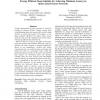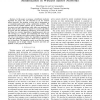66 search results - page 2 / 14 » Reducing Network Energy Consumption via Sleeping and Rate-Ad... |
INFOCOM
2011
IEEE
12 years 8 months ago
2011
IEEE
A simple random walk (SRW) has been considered as an effective forwarding method for many applications in wireless sensor networks (WSNs) due to its desirable properties. However...
GLOBECOM
2010
IEEE
13 years 2 months ago
2010
IEEE
Abstract--Energy-efficient optical networks are gaining momentum as environmental-friendly solutions with reduced operational costs. Energy-efficiency can be achieved by using devi...
WINET
2011
12 years 11 months ago
2011
Sleep scheduling, which is putting some sensor nodes into sleep mode without harming network functionality, is a common method to reduce energy consumption in dense wireless sensor...
SUTC
2006
IEEE
13 years 11 months ago
2006
IEEE
Energy management in sensor networks is crucial to prolong the network lifetime. Though existing sleep scheduling algorithms save energy, they lead to a large increase in end-to-e...
VTC
2006
IEEE
2006
IEEE
Distributed Stochastic Power and Rate Allocation for Energy Minimization in Wireless Sensor Networks
13 years 11 months ago
— In this paper, we propose a distributed stochastic algorithm for power and rate allocation in ad hoc wireless sensor networks. The problem we deal with is formulated as a trans...


